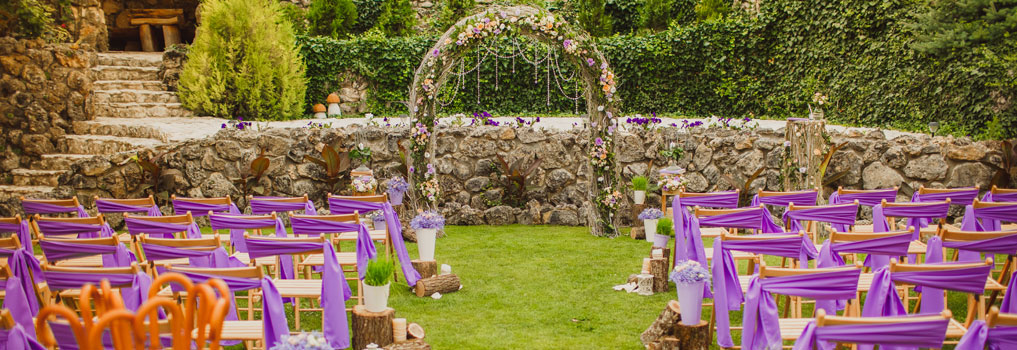Wedding ceremony locations - tips
The ceremony location is important, even if you are not spending hours there, as this is where the most significant part happens: the vows and the actual commitment made publically and officially. Whether you are religious or not, you will still need an officiant, still need some vows, still need at least a couple of witnesses! For some, the wedding ceremony location is critically romantic; for others, it is purely a formal obligation. It can be both so here are a few tips to help you plan the one right for you both…
DO YOU WANT A RELIGIOUS CEREMONY?
Even if you are not practising, a lot of couples do prefer to marry in a church or place of worship. But booking a place of worship is not the same as booking a venue. You need to check on both the availability and also the possibility of your wedding taking place. Some religious establishments don’t permit unless at least one of you is a member or a practising believer. Some require you have faith talks beforehand.
CHECK ON THE PROTOCOL FOR FLOWERS AND CLOTHES
Seriously! Some religious establishments do not allow ornate decorations, flowers or dresses that expose skin so check first that the wedding is not going to offend them.
CONSIDER CHOOSING A NEUTRAL LOCATION
if you and your fiance come from different faith backgrounds or have different religious beliefs. You should discuss this with your respective families prior to booking though.
CONSIDER A NATURAL SETTING
If you are not religious but do want to include a spiritual dimension and your beliefs, consider holding the ceremony in a natural setting (woodland, a park, a garden, a beach) although you may still require a permit and there will be the logistics of parking, mobility and so forth for the disabled and elderly.
COMBINE THE CEREMONY LOCATION WITH THE RECEPTION LOCATION
This would certainly help your guests and make transportation, decor and set-up easier to manage! However, you still need to check regarding permits.
IF YOU ARE THINKING OF A HOME WEDDING
...you may be in for a shock! A lot of couples prefer to marry in either one of their homes or at someone else’s residence if that home has some specific emotional connection. However, ironically, this could be a very expensive option as you will be responsible for absolutely everything - from cutlery to linen, to false floors, the fire extinguishers, portable toilets (if you have more than twenty guests), fumigating and mowing the lawn, home improvements and valet parking. You will also need permits - for the music, entertainment and noise, the traffic ordinances, fire codes, marquee permits. YOu will have to alter your homeowner’s insurance company regarding taking out an umbrella policy for several days to cover you, your guests and any vendors. The insurance will be a few hundred dollars but not as much as a claim!
CHOOSE A THEMED LOCATION
For example, a barn or vineyard. Consider the preparation that will be required, however. You will probably be responsible for clearing it out, getting portable toilets (if outdoors), bringing in tables, chairs, lighting, heating. If it is outdoors, remember there are no guarantees with Nature so you should have a thoroughly worked out Plan B which takes time, effort and planning. Also, remember you will be responsible for ensuring no litter or mess is left behind - even if you are holding the wedding reception elsewhere.
OR YOU COULD CHOOSE A TRADITIONAL CEREMONIAL LOCATION
This is ideal if you want a religious ceremony in the bride’s hometown with the wedding reception held at a nearby location, also if most of your guests have local or religious connections. Check how you can schedule your ceremony, how long it will last and what time your reception can begin. Some churches need the wedding ceremony to be completed by 4pm on a Saturday so they can prepare for mass or the next day’s service.
CONSIDER AN UNUSUAL LOCATION
These could include museums, universities, retreats, cinemas, mountain retreats, universities, mansions, mountain lodges, barns, photographers’ or artists’ galleries, botanical gardens, a sports venue or civic center. You can usually bargain a good deal as weddings aren’t their usual remit. However, you do need to get information on the liquor license, capacity for guests, fire plan (you may need a fire marshall), limitations and liability insurance - usually a couple of hundred dollars and can cover you up to a million. As long as you get the permits, you are good to go and, if you choose something you have an interest in or where there is an awesome view or exhibits, you will keep your guests entertained.
